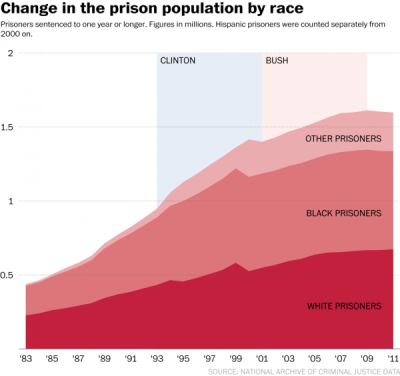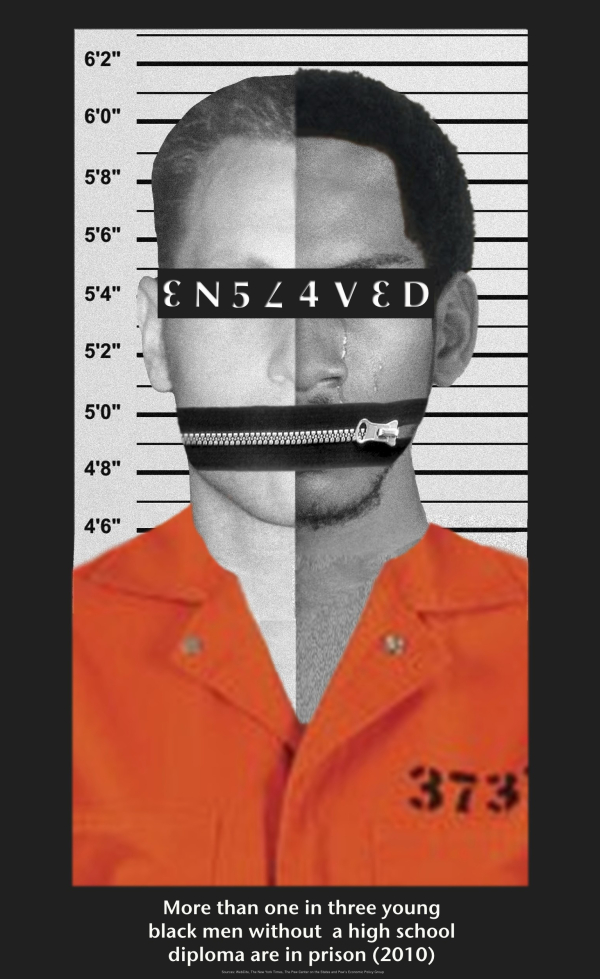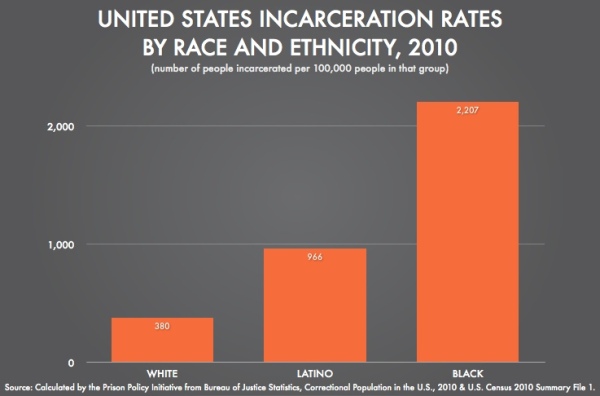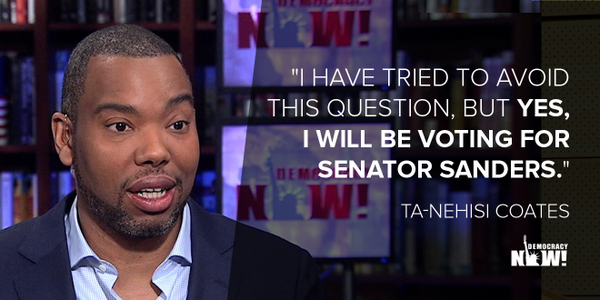Artwork by IAN KAY
THE NATION: The love affair between black folks and the Clintons has been going on for a long time. It began back in 1992, when Bill Clinton was running for president. He threw on some shades and played the saxophone on The Arsenio Hall Show. It seems silly in retrospect, but many of us fell for that. At a time when a popular slogan was “It’s a black thing, you wouldn’t understand,” Bill Clinton seemed to get us. When Toni Morrison dubbed him our first black president, we nodded our heads. We had our boy in the White House. Or at least we thought we did.
Black voters have been remarkably loyal to the Clintons for more than 25 years. It’s true that we eventually lined up behind Barack Obama in 2008, but it’s a measure of the Clinton  allure that Hillary led Obama among black voters until he started winning caucuses and primaries. Now Hillary is running again. This time she’s facing a democratic socialist who promises a political revolution that will bring universal healthcare, a living wage, an end to rampant Wall Street greed, and the dismantling of the vast prison state—many of the same goals that Martin Luther King Jr. championed at the end of his life. Even so, black folks are sticking with the Clinton brand. What have the Clintons done to earn such devotion? Did they take extreme political risks to defend the rights of African Americans? Did they courageously stand up to right-wing demagoguery about black communities? Did they help usher in a new era of hope and prosperity for neighborhoods devastated by deindustrialization, globalization, and the disappearance of work? No. Quite the opposite. MORE
allure that Hillary led Obama among black voters until he started winning caucuses and primaries. Now Hillary is running again. This time she’s facing a democratic socialist who promises a political revolution that will bring universal healthcare, a living wage, an end to rampant Wall Street greed, and the dismantling of the vast prison state—many of the same goals that Martin Luther King Jr. championed at the end of his life. Even so, black folks are sticking with the Clinton brand. What have the Clintons done to earn such devotion? Did they take extreme political risks to defend the rights of African Americans? Did they courageously stand up to right-wing demagoguery about black communities? Did they help usher in a new era of hope and prosperity for neighborhoods devastated by deindustrialization, globalization, and the disappearance of work? No. Quite the opposite. MORE
THE NEW REPUBLIC: A true paradox lies at the heart of the Clinton legacy. Both Hillary and Bill continue to enjoy enormous popularity among African Americans despite the devastating legacy of a presidency that resulted in the impoverishment and incarceration of hundreds of thousands of poor and working-class black people. Most shockingly, the total numbers of state and federal inmates grew more rapidly under Bill Clinton than under any other president, including the notorious Republican drug warriors Richard Nixon, Ronald Reagan, and George H. W. Bush. […]
As president, Bill Clinton and his allies embarked on a draconian punishment campaign to outflank the Republicans. “I can be nicked a lot, but no one can say that I’m soft on crime,” he bragged. Roughly a year and a half after the 1992 Los Angeles Rebellion—the largest civil disturbance in U.S. history in which demonstrators took to the streets for six straight days to protest the acquittal of the officers involved in the Rodney King beating—Clinton passed the Violent Crime Control and Law Enforcement Act. At its core, this legislation was a federal “three strikes” bill that established a $30.2 billion Crime Trust Fund to allocate monies for state and municipal police and prison expansion. Like its predecessors, starting with Johnson’s Omnibus Crime Control and Safe Streets Act, the federal government provided funding to accelerate punitive policies at all levels of governance. Specific provisions included monies for placing 100,000 new police on the streets, the expansion of death penalty eligible crimes, lifetime imprisonment for people who committed a third violent federal felony offense with two prior state or federal felony convictions, gang “enhancements” in sentencing for federal defendants, allowing children as young as 13 to be prosecuted as adults in special cases, and the Violence Against Women Act.
Hillary strongly supported this legislation and stood resolutely behind her husband’s punishment campaign. “We need more police, we need more and tougher prison sentences for repeat offenders,” Hillary declared in 1994. “The ‘three strikes and you’re out’ for violent offenders has to be part of the plan. We need more prisons to keep violent offenders for as long as it takes to keep them off the streets,” she added. Elsewhere, she remarked, “We will finally be able to say, loudly and clearly, that for repeat, violent, criminal offenders: three strikes and you’re out.”
Like his notorious Republican predecessors, Clinton imposed a toxic mix of punishment and withdrawal of social welfare, but with a difference. The Democratic president actually implemented these policies on a much larger scale than the Republican New Right. According to New Jim Crow author Michelle Alexander, “Far from resisting the emergence of the new caste system” that Ronald Reagan had codified into law through the Anti-Drug Abuse Acts of 1986 and 1988, “Clinton escalated the drug war beyond what conservatives had imagined possible a decade earlier.”
In the 1980s and 1990s, incarceration became de facto urban policy for impoverished communities of color in America’s cities. Legislation was passed to impose mandatory minimums, deny public housing to entire families if any member was even suspected of a drug crime, expand federal death penalty-eligible crimes, and impose draconian restrictions of parole. Ultimately, multiple generations of America’s most vulnerable populations, including drug users, African Americans, Latinos, and the very poor found themselves confined to long-term prison sentences and lifelong social and economic marginality. The carceral effects of the New Democrats’ competition with the Republicans vastly increased the ranks of the incarcerated. State and federal prisons imprisoned more people under Clinton’s watch than under any previous administration. During his two terms, the inmate population grew from roughly 1.3 million to 2 million, and the number of executions to 98 by 1999. Significantly, the Democratic president even refused to support the Congressional Black Caucus’s proposed Racial Justice Act, which would have prevented discriminatory application of the death penalty. Despite this terrible record of racialized punishment for political gain, the Clintons’ peculiar ability to reinvent themselves has erased memory of many of their past misdeeds. MORE
RELATED: Ta-Nehisi Coates thinks Sen. Bernie Sanders’ (I-Vt.) stance on reparations is questionable, but he still intends to cast his ballot for him. On Wednesday, in an interview with Democracy Now, the writer, journalist and educator declared his support for the Bern. Coates has been critical of Sanders’ aversion to reparations — a topic in which the Atlantic correspondent is very well versed:
If not even an avowed socialist can be bothered to grapple with reparations, if the question really is that far beyond the pale, if Bernie Sanders truly believes that victims of the Tulsa pogrom deserved nothing, that the victims of contract lending deserve nothing, that the victims of debt peonage deserve nothing, that that political plunder of black communities entitle them to nothing, if this is the candidate of the radical left — then expect white supremacy in America to endure well beyond our lifetimes and lifetimes of our children. MORE



